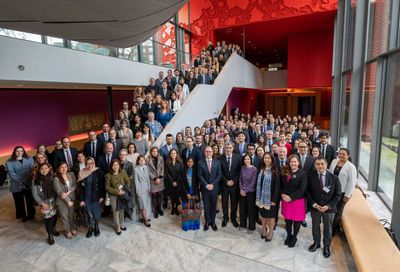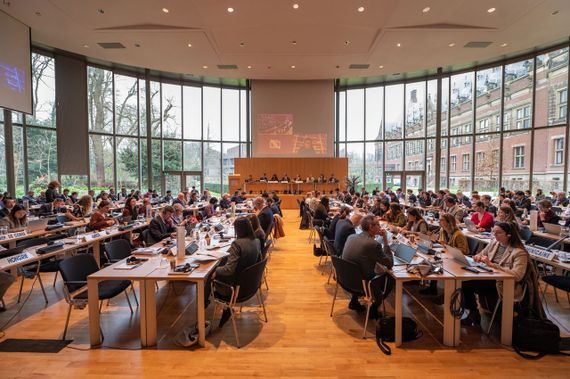CGAP 2024 – Conclusions & Decisions now available!

The Council on General Affairs and Policy (CGAP) of the HCCH met from 5 to 8 March 2024. The meeting was attended by over 429 participants, representing 74 HCCH Members, 5 non-Member States, 7 intergovernmental organisations, 8 international non-governmental organisations, and members of the Permanent Bureau (PB). The Conclusions & Decisions adopted by CGAP are now available in English, French, and Spanish.
In terms of work relating to possible new legislative instruments, CGAP noted progress made by the Working Group (WG) on Parentage / Surrogacy and by the WG on Jurisdiction on the development of draft provisions for, respectively, a draft instrument and a draft Convention, and invited the PB to convene two further meetings of each WG. CGAP also mandated the establishment of an Experts’ Group (EG) to study the applicable law and jurisdiction issues raised by the cross-border use and transfer of Central Bank Digital Currencies (CBDCs), and, in partnership with relevant subject matter experts and Observers, to study the private international law (PIL) issues relating to digital tokens. CGAP further mandated the PB, subject to available resources, to continue to monitor developments in the digital economy with respect to digital platforms, artificial intelligence and automated contracting, and immersive technologies. Finally, CGAP mandated the PB to monitor developments of the PIL aspects of voluntary carbon markets and to cooperate and coordinate with the Secretariats of relevant international organisations on their projects in relation to voluntary carbon credits. Across several projects, CGAP welcomed the cooperation with UNCITRAL, UNIDROIT, and WIPO, including with respect to work in the areas of digital economy, restructuring and insolvency proceedings and intellectual property.
In relation to post-Convention work, CGAP endorsed the Conclusions and Recommendations of the Eighth Meeting of the Special Commission (SC) on the 1980 Child Abduction and 1996 Child Protection Conventions, and welcomed preparations for the upcoming meeting of the SC on the 1965 Service, 1970 Evidence and 1980 Access to Justice Conventions. In the area of family and child protection law, CGAP invited the PB to convene two further meetings of the WG on the Financial Aspects of Intercountry Adoption and mandated the establishment of two WGs in relation to the 1996 Child Protection Convention. The first WG is to complete the 1996 Country Profile and, subsequently, progress work on the draft Cooperation Request Recommended Model Form, while the second WG is to focus on the operation of Article 33 of the Convention by, first, developing a Model Form and, subsequently, developing a Guide on the application of Article 33. CGAP also welcomed the holding of a Forum on Domestic Violence and the Operation of Article 13(1)(b) of the 1980 Child Abduction Convention in June 2024 and the holding of the fifth Malta Conference on Cross-Frontier Child Protection and Family Law (Malta V) in September 2024. In the area of transnational litigation, CGAP approved the establishment of two WGs to review and refine updates to the Handbooks and Country Profiles relevant to the 1965 Service and 1970 Evidence Conventions, respectively. CGAP also took note of updates made to the Practical Guide to Access to Justice for International Tourists and Visitors, inviting the PB to proceed with its publication, and supported the proposal, subject to available resources, to dedicate the 2024 Edition of HCCH a|Bridged to the 2019 Judgments Convention. Finally, in the area of international commercial, digital, and financial law, CGAP mandated the PB to continue to study digital developments in respect of securities markets; the interpretation of analogous institutions for the purpose of Article 2 of the 1985 Trusts Convention; and the feasibility, desirability, and necessity of developing guidance on applicable law in international contracts providing protection to weaker parties.
From a good governance perspective, CGAP noted the PB’s plans regarding the implementation of Spanish as an additional official language, discussed the format of future HCCH meetings, and mandated the PB to continue to actively seek appropriate geographic and gender representation in its work.
